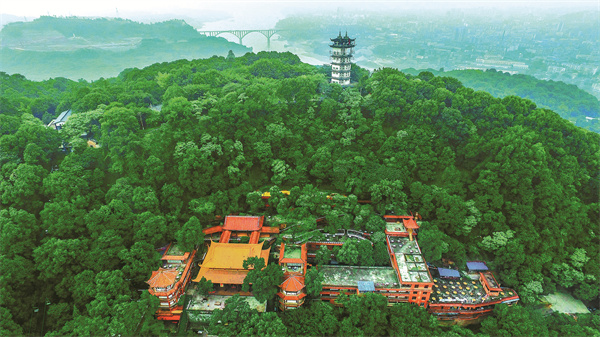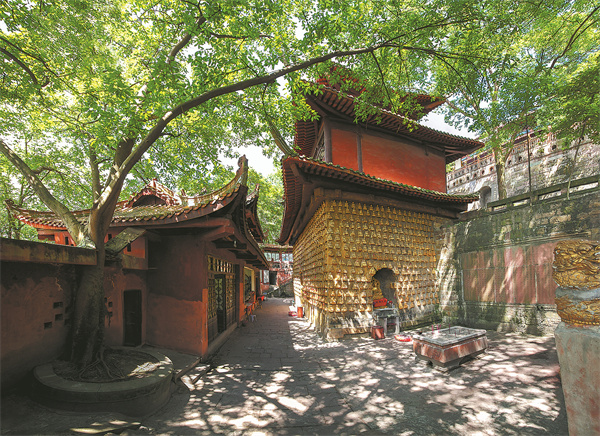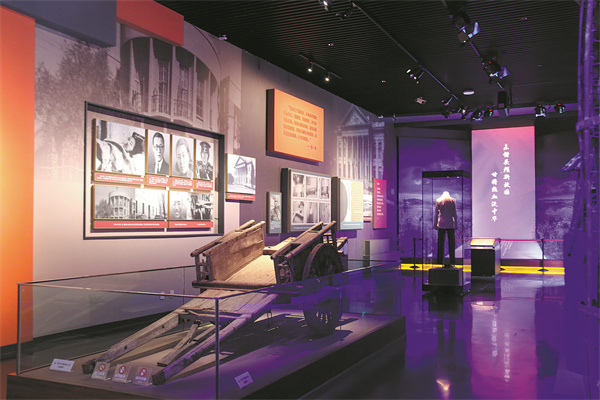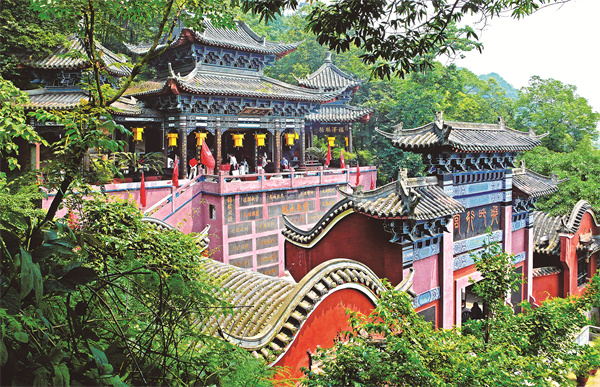
Visitors to Yibin in Sichuan province may, sometimes, be caught by surprise to see a large and tranquil mountain in the city's downtown.
Taxi drivers tell them that it's Cuiping Mountain, the second-largest man-made forest scenic area in China, next to the Purple Mountain in Nanjing, Jiangsu province.
Locals love to walk on the mountain all year round to keep fit, they say.
Tourists who climb Cuiping out of curiosity find themselves in a green sea in all four seasons. The mountain abounds in different flowers and squirrels and egrets jump gleefully on branches.
Cuiping is rich in vegetation, with about 350 species, including rare trees such as the Chinese parasol, Chinese yew, Phoebe zhennan (golden-thread nanmu) and Metasequoia (commonly known as the dawn redwood), said Zhou Yaqiu, an information official in Yibin.
Cuiping not only has the simple and colorful cycle of nature's four seasons but also attracts tourists with a memorial hall for Zhao Yiman, a household national heroine, along with its time-honored Buddhist culture and ancient architecture.

The former Cuiping Academy, built on Cuiping Mountain in 1482 during the Ming Dynasty (1368-1644), is the site of the Zhao Yiman Memorial Hall established in 1960.
On Sept 1, 2014, the State Council announced the first batch of 80 national-level memorial facilities and sites relating to the Chinese people's War of Resistance Against Japanese Aggression (1931-45) and the hall was the only selected memorial site in Sichuan.
Zhao, a local from Yibin, was a renowned heroine in the war.
In 1935, she was wounded and captured during combat as the political commissar of the Second Regiment of the First Division of the Third Army of the Northeast People's Revolutionary Army.
Due to repeated torture by the enemy, she was badly injured and sent to the then Harbin Municipal Hospital in today's Heilongjiang province for treatment under surveillance.
During her hospitalization, Zhao's patriotism moved her doctor Zhang Boyan, nurse Han Yongyi and guard Dong Xianxun.
The trio helped Zhao escape. Unfortunately, two days after her escape with their help, Zhao was caught again by the enemy who subjected her to various forms of torture, such as forcing chili water into her mouth, hanging and grilling her, stabbing her nails with bamboo spikes, and placing a hot iron on her wound.

Zhao did not surrender and was eventually killed.
The Zhao Yiman Memorial Hall has 828 exhibits related to Zhao, including her famous Letter to My Son.
On Aug 2, 1936, Zhao, who was only 31, penned her farewell letter to her 7-year-old son on the train heading to the execution ground.
She wrote:
"Ning'er,
It is truly a regret that I, as your mother, have not been able to fulfill my responsibility in your education. Mother has resolutely fought against the Japanese invasion, and today has reached the eve of sacrifice. Mother and you will never have the chance to meet each other again in this lifetime. My dearest child! I cannot educate you with many words, but I will educate you through action. After you grow up, I hope you will not forget that your mother sacrificed herself for the country. After my death, my child, you must continue the struggle on behalf of your mother, grow strong, and comfort your mother in the underworld!
Aug 2, 1936
Your mother, Zhao Yiman, on the train"

Zhao's son Ning'er saw the letter 21 years after his mother's sacrifice as the letter was found in the Japanese military interrogation archives in 1957. The letter has moved countless visitors since the memorial hall was opened 65 years ago.
Another attraction on the mountain is the Thousand Buddha Temple, first built in the Tang Dynasty (618-907). It is home to 1,032 Buddhist statues, said the temple's abbot, Yang Dawei.
READ MORE: Inland Sichuan a new frontier of opening-up
Every day, bell chimes echo through the dense forests of the mountain, giving testimony to the temple's millennia of history, ushering in a solemn atmosphere.
During the Labor Day holiday from May 1 to 5 this year, a record 140,600 people visited the mountain, up 11 percent over the same period last year, said Huang Hao, deputy director of the Cuiping Mountain scenic area management center.


